Mary Hoffman's Blog, page 3
November 30, 2020
What can't you bear?
I belong to an online Forum called Gransnet. There is quite a lot of grumbling on Gransnet, especially about fairly hopeless-sounding husbands. And a lot of the Grans get on very badly with their daughters-in-law - and vice versa. But they also like to have rants about language.
This was a recent post, headlined "English language - where is it going to?"
"Maybe I'm being unreasonable and very menopausal but there are words that are getting under my skin.
* "Co-worker" seems to be a new word for colleague.
* "Super" this and "super" that instead of "very" or "huge", etc.
* "Denied", e.g. as in "he/she was denied entry" - instead of "refused entry", or other cases where the world "refused" would make more sense than the word "denied".
* Where has the word "donated" gone to. It's now "gifted".
* I get confused when reading a newspaper or magazine article where people are now referred to by their surnames only without the Mr/Mrs/Miss/Ms. I lose the plot as to who is who  . I'd prefer to referred to as Mrs Surname or my first name."
. I'd prefer to referred to as Mrs Surname or my first name."
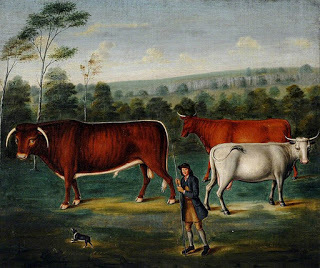 A cow worker or a co-worker?
A cow worker or a co-worker?This one got a lot of replies (195 in fact). Here are some of the words and expression that Grans just won't be having with:
Awesome
My bad
Meet with
Myself
Task (as a verb)
Going forward
Uni
Off of
Gift (as a verb)
Woke
At this moment in time
Fur baby (for a pet)
 Credit: Nancy Wong Is this a fur-baby?
Credit: Nancy Wong Is this a fur-baby? Can I get ...?
Reach out (for contact)
Park up
Invite (as a noun)
Beginning sentences with "so."
You can see they are a militant, not to say belligerent gathering of grans.
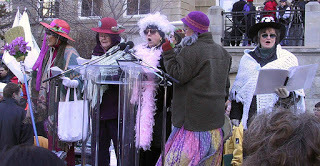 Raging Grannies by Grant Neufeld
Raging Grannies by Grant NeufeldA lot of the dislikes are for American expressions: "meet with," "reach out" (which I've seen elsewhere is OK if you are one of the Four Tops, otherwise not), "woke," "Can I get...?" "Awesome." But there was a lively discussion about "gotten," which is an American import that was originally an English export. Tricky.
A lot use an unnecessary preposition in post-position: "off of," "inside of."
But over to you. What are your pet language hates?
Word of the week: Celebrity
A noun that used to mean "fame" but now means "someone famous." It was Chris Patten who defined it in 2011 as "someone I've never heard of." There was news today that the NHS is planning a series of ads with celebrities, serious ones, advocating having the Covid-19 vaccine. Who would you choose? I think John Craven, Trevor MacDonald, Judi Dench, Marcus Rashford, David Attenborough, Mary Berry, Juliet Stevenson.
November 23, 2020
OED word list 2020
Not a word of the week, nor yet a word of the year, which the OED usually decide on at this time, but a whole list of words, over forty of them. Not surprisingly, most are linked to the Coronavirus pandemic. But others relate to political activism, like "allyship" and "BLM."
Some, like "Veronica bucket" and "sanny" are quite new to me. How many do you know and use and do you think the OED has left any out that you would have included?
allyship n. active support for the rights of a minority or marginalized group without being a member of it
anthropause n. a global slowdown of travel and other human activities
anti-masker n. a person who opposes the wearing of face masks
anti-vaxxer n. a person who is opposed to vaccination
BC. before Covid/before coronavirus
Black Lives Matter n. a movement formed to campaign against systemic racism and violence against black people blended learning n. a style of education in which students learn via electronic and online media as well as traditional face-to-face teaching
BLM. Black Lives Matter
Blursday n. a day of the week that is indistinguishable from any other
bubble n. (during an outbreak of an infectious disease) a restricted group of people whose members are allowed to be in close proximity when maintaining a physical distance is otherwise required
cancel culture n. a culture in which there is a widespread practice of publicly rejecting or withdrawing support from people or things regarded as promoting socially unacceptable views
circuit breaker n. (a) an automatic device for stopping the flow of current in an electric circuit as a safety measure; (b) an automatic, temporary halt placed on stock trading, typically as a means of inhibiting panic selling; (c) a short period of lockdown intended to inhibit the spread of an infectious disease
community transmission n. transmission of an infectious disease or pathogen between members of a community, especially as a result of casual contact
coronavirus n. any of a group of RNA viruses that cause a variety of respiratory, gastrointestinal, and neurological diseases in humans and other animals; (specifically) a coronavirus responsible for an outbreak of serious respiratory disease in humans, especially the major pandemic beginning in 2019
Covid-19 n. an acute disease in humans caused by a coronavirus, which is characterized mainly by fever and cough and is capable of progressing to pneumonia, respiratory and renal failure, blood coagulation abnormalities, and death, especially in the elderly and people with underlying health conditions; (also) the coronavirus that causes this disease
covidiot n. (depreciative) a person who disobeys guidelines designed to prevent the spread of Covid-19
decolonize v. to free (an institution, sphere of activity, etc.) from the cultural or social effects of colonization
defund v. to cease to fund (something)
doomscrolling n. the action of compulsively scrolling through social media or news feeds which relate bad news
flatten the curve v. to take measures designed to reduce the rate at which infection spreads during an epidemic, with the aim of lowering the peak daily number of new cases and extending the period over which new cases occur
furlough originally associated with members of the armed forces going on leave, and was chiefly used in the US. In March and April 2020 though, when it started to be used in other countries as employers were given grants to pay employees who were not working, usage shot up
hygiene theatre n. cleaning practices which give the illusion of sanitization without reducing the risk of infection
infodemic n. a proliferation of diverse, often unsubstantiated information relating to a crisis, controversy, or event, which disseminates rapidly and uncontrollably through news, online, and social media, and is regarded as intensifying public speculation or anxiety
Juneteenth n. 19 June, celebrated as a holiday commemorating the emancipation of African-American slaves in Texas on that date in 1865.
learning modality n. a method of delivery of teaching and learning
lockdown n. a state of isolation, containment, or restricted access, usually instituted for security purposes or as a public health measure; the imposition of this state
mail-in adj. designating ballots, surveys, etc., in which results are collected by mail
moonshot n. an extremely ambitious and innovative project
net zero n. a target of completely negating the amount of greenhouse gases produced by human activity, to be achieved by reducing emissions and implementing methods of absorbing carbon dioxide from the atmosphere
pandemic n. a disease which is epidemic over a very large area and affects a large proportion of a population; an outbreak of such a disease
personal protective equipment n. clothing and equipment designed to provide the wearer or user protection against hazardous substances or environments, or to prevent transmission of infectious diseases
plandemic n. a planned pandemic
PPE = personal protective equipment
R number n. reproduction number, the average number of cases of an infectious disease arising by transmission from a single infected individual
rona n. (informal) coronavirus; Covid-19
sanny n. (chiefly Australian) hand sanitizer
self-isolate v. to undertake self-imposed isolation for a period of time, typically in one’s own home, in order to avoid catching or transmitting an infectious disease, or as one of a number of public health measures designed to inhibit its spread
social distancing n. the action or practice of maintaining a certain physical distance from, or limiting physical contact with, another person or people (especially family and friends), especially in order to avoid catching or transmitting an infectious disease, or as one of a number of public health measures designed to inhibit its spread
superspreader n. an individual infected with a (pathogenic) microorganism who transmits it to an unusually large number of other individuals
systemic racism n. discrimination or unequal treatment on the basis of membership of a particular ethnic group (typically one that is a minority or marginalized), arising from systems, structures, or expectations that have become established within society or an institution
take a knee v. to go down on one knee as a peaceful means of protesting against racism
twindemic n. the simultaneous occurrence of two pandemics
unmute v. to turn on (a microphone or the audio on an electronic device), especially after having temporarily turned it off
Veronica bucket n. a type of sanitation equipment consisting of a covered bucket with a tap fixed at the bottom and a bowl fitted below to collect wastewater
virtue-signalling n. (depreciative) the public expression of opinions or sentiments intended to demonstrate one’s good character or the moral correctness of one’s position on a particular issue
wet market n. (South-East Asian) a market for the sale of fresh meat, fish, and produce
wokeness n. the fact or quality of being alert to racial or social discrimination and injustice
workation n. a working vacation; a holiday during which one also works
Zoombombing n. the practice of infiltrating video conference calls on the Zoom application, and posting violent, pornographic, or offensive content
November 16, 2020
Hearing voices
Today's topic is Voice, an aspect of the Verb.
Perhaps you are already familiar with the difference between the Active and Passive voice? Here's a quick refresher:
"The dog bit the man" and "the man bit the dog" are both sentences in the active voice. They have the same grammatical structure, even though the event described is different.
"The man was bitten by the dog" and "the dog was bitten by the man" are both in the passive voice. They are describing the same incidents as in the first two sentences but with a different grammatical structure. (Followers of Chomsky might say they had the same Deep Structure as the first two).
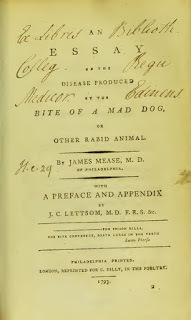
All clear so far?
What about these examples:
"The wine cost £10 a bottle"
"This dress washes at 40 degrees"
"The cake cooks well in the fan-assisted oven"
"Her books sell well"
"I photograph really badly"
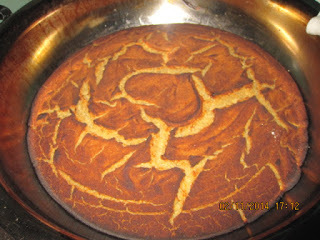 Image: PETER LUNGILE CHIDOTHE
Image: PETER LUNGILE CHIDOTHEThey are neither active nor passive. When I started to learn Classical Greek I was charmed to discover it had a Middle Voice that fitted the above examples perfectly. (It also has an extra number - dual, an extra mood - optative, and extra tense - the aorist, though it sadly lacks one case in noun declension - the ablative. You have to use the genitive absolute in Greek, which sounds vaguely rude).
Once you have noticed the middle voice, you will see it everywhere.
Word of the week: Nocebo
Here, I was at first inclined, like Polonius, to exclaim, "vile phrase!" But it is a perfectly "cromulent" word as The Simpsons would say. It crops up in a report about people's reactions to taking statins. It is:
"a word that means in Latin "I will harm," as placebo means "I will please." A placebo makes patients feel better for reasons unrelated to the specific healing properties of the treatment. A nocebo makes patients feel worse (or does other harm) in the same way." Harvard Health
November 9, 2020
Harold be thy name
This is a post about "mondegreens," which is in some ways linked to the one on malapropisms.
A Mondegreen results from a mis-hearing of a phrase or word in a poem or song lyric. American writer Sylvia Wright coined the term in 1954, writing that as a girl, when her mother read to her from Percy's Reliques, she had misheard the lyric "layd him on the green" in the fourth line of the Scottish ballad The Bonny Earl of Murray, as "Lady Mondegreen."
 I'm sure many of you have heard of the mondegreen, "Gladly, thy cross-eyed bear," taken from mis-hearing a hymn line: "gladly thy cross I'd bear." And I've always liked "Our Father, which art in Heaven/ Harold be thy name. (I like to think of God's real name being Harold).
I'm sure many of you have heard of the mondegreen, "Gladly, thy cross-eyed bear," taken from mis-hearing a hymn line: "gladly thy cross I'd bear." And I've always liked "Our Father, which art in Heaven/ Harold be thy name. (I like to think of God's real name being Harold). But I hadn't realised how widespread they were and that they work in other languages than English too. Wright said that the point about them and why they needed a term coined for them was that they are often better than the original wording.
Certainly,
"They hae slain the Earl o' Moray,
And Lady Mondegreen"
does make one wonder about Lady Mondegreen and why she had to die too!
Yet the mishearing of The Star-spangled Banner to produce the nonsense adverb "donzerly light" perhaps doesn't quite make up in mystery for the lack of meaning.
A Monk Swimming by Malachy McCourt is so titled, according to Wikipedia, because of a childhood mishearing of a phrase from the Catholic rosary prayer, Hail Mary. "Blessed art thou amongst women" became "a monk swimmin'." And I can just see that monk doing the front crawl to approach the BVM.
Likewise, Olive, the Other Reindeer is a 1997 children's book by Vivian Walsh, which borrows its title from a mondegreen of the line, "all of the other reindeer" in the famous Christmas song about Rudolph.
You can have reverse mondegreens too, as in the song which goes:
Mairzy doats and dozy doats and liddle lamzy divey
A kiddley divey too, wouldn't you?
The clue to the meaning is contained in the bridge:
If the words sound queer and funny to your ear, a little bit jumbled and jivey,Sing "Mares eat oats and does eat oats and little lambs eat ivy."This makes it clear that the last line is "A kid'll eat ivy, too; wouldn't you?"
This was apparently sung to me as a baby, since my mother was called Ivy (though not spelled in the standard way) and, by extension, my father sometimes called me "Mairzy doats," which makes me a sort of Lady Mondegreen myself!
Word of the week: Mail-in ballot
We call them postal votes in the UK and they seem a very good idea, especially in a pandemic. CNN say 'This is a blanket term for any ballot mailed to voters, though the completed forms can be returned by mail, to a dropbox or in person to officials or polling places. In three critical states -- Pennsylvania, Michigan and Wisconsin -- officials weren't able to start processing any of these ballots until Election Day, which led to huge backlogs and slowed down the count."
But Donald Trump referred to them just as "ballots" which confused me, as every vote is a ballot and, when he said, "if there were no ballots, there would be no problem," he seemed to be saying, "if there were no votes, the election wouldn't be problematic."
Actually, he probably does think that at this moment. Ironically, he voted by mail-in ballot himself.
November 5, 2020
The way that you say it
This is a post about accents and dialects. Let's get one thing straight at the beginning. EVERYBODY has an accent and a dialect! There is no such thing as a neutral accent or dialect, but there are some that have been accepted (by whom?) as the norm.
In English, the way of speaking known as Received Pronunciation (RP), or BBC English or The Queen's English is an accent of the South East of the country, which has been accepted so long as some sort of gold standard that people who use it, like me, sometimes state that they don't "have an accent at all." But we do; it's just that ours has been deemed the way everyone "ought" to speak.
Even RP changes. The very clipped version known as XRP (ex-Received Pronunciation) can be heard if you listen to wartime radio news bulletins or the Queen's early broadcasts. This has mutated over time within the Royal Family, so that Prince William's accent is much closer to his non-Royal contemporaries' - even though Prince Charles still pronounces "house" to rhyme with "mice."

If you watch the Netflix series The Crown, you will hear that Claire Foy and Olivia Coleman have modified the XRP accent of the monarch and not precisely imitated it but given a impression of greater formality and inhibition in language which goes well with the role. Of course people do tailor their accents and everything else linguistic to suit their context and companions. This is known as register and maybe we can talk about that another time.
Ex-PM Tony Blair was much mocked for adopting a glottal stop and other aspects of what is disparagingly called Estuary English, in order to sound more like a man of the people. He was also a converger, which I have some sympathy for, since I am one myself. My daughters used to say they could tell who was on the other end of the phone by the accent I adopted while talking to them.
Anyway, accent is different from dialect, because it is about phonology and intonation. Whereas dialect is about vocabulary and syntax. Of course, it's true that people who use a regional dialect will probably have a regional accent too.
The dialect equivalent of RP is Standard English (SE). It is possible to speak SE with a regional accent, whether from this country, the USA, Canada, Australia or New Zealand, without using a different dialect. Nicola Sturgeon, Jacinda Ardern, Justin Trudeau and Joe Biden all speak Standard English but with the accents of the countries they come from.
 So who are the dialect-speakers apart from ourselves? You may well be a user of dialect yourself and not use Standard English, except in rare formal situations like a job interview. If you want to listen to English regional accents and dialects, this is a good site: https://www.dialectsarchive.com/england
So who are the dialect-speakers apart from ourselves? You may well be a user of dialect yourself and not use Standard English, except in rare formal situations like a job interview. If you want to listen to English regional accents and dialects, this is a good site: https://www.dialectsarchive.com/englandWhat is true of English is true of other languages too. If you are an Italian speaker and travel in Tuscany you will hear the distinctive pronunciation of "c"s and "g"s of the locals, so that "Coca Cola" sounds like "Chocha Chola" with a sound like the "ch" in "loch."
There are well-known "dialect poets" like Roberts Burns and William Barnes who wrote as they spoke. And many examples in prose literature, which are hard to read, because they are signalled by a lot of extra punctuation and new spellings (to represent accents). You will find many examples in Thomas Hardy, D H Lawrence, Mark Twain and Harper Lee, but it's fair to say that these last are not using their own speech patterns but those of their less well-educated and lower status characters.
When does a dialect become a separate language? The "Romance languages" (French, Italian, Spanish etc.) began as dialects of spoken Latin. Some people believe that a dialect becomes a language when it acquires a definitive written form.
As a coda to thinking about accent and dialect, there is an even smaller sample than a region: a person's idiolect. (This is, along with zeromorph, one of my favourite linguistic terms). It cover's an individual's speech patterns - both accent and intonation, choice of words, characteristic expressions and so on. It is how we can recognise immediately on the radio or in a telephone call a great range of people from celebrities to personal friends.
Word of the week: What else can in be but lockdown? Here in England today is the first of a four week lockdown, meaning not quite what it did at the end of March.
"noun1. the confining of prisoners to their cells, as following a riot or other disturbance: The prison lockdown continues, more than three weeks after the death of a guard.2. a security measure taken during an emergency to prevent people from leaving or entering a building or other location: The school remains under lockdown due to police activity in the area.The governor implemented a statewide lockdown to slow the spread of the virus—residents may not leave their homes for nonessential activities.The army base was on lockdown after a report of shots fired.3. a freeze or pause: Banks aren’t lending during this credit lockdown."Lockdown definition dictionary.com The kind we are embarking on today fits the second definition, though it can feel a lot like the first.
November 2, 2020
Grammar Grandma is running late this week
Because of the new lockdown starting on Thursday and the fact that we are due to move house at the end of the month, we are rushing around like headless chickens trying to fit in what we need to do Monday-Wednesday.
I hope to post on Thursday.
October 26, 2020
Mrs Malaprop walks among us
Mrs Malaprop was a character created by English playwright Richard Brinsley Sheridan in his play The Rivals (1775). Her name is a nod to the French expression mal à propos, or inappropriate. What Mrs M does is misuse words, in much the same way as Dogberry does in Shakespeare's Much Ado About Nothing, which was one of my A level set texts (we also had King Lear, thank God).
 Mrs Malaprop in The Rivals (1895)
Mrs Malaprop in The Rivals (1895)
We recently re-watched the DVD of Kenneth Branagh's sundrenched film of Much Ado, in which Dogberry was played by Michael Keaton and his sidekick Verges by Ben Elton, and they were so excruciatingly unfunny as to de-rail an otherwise excellent version (Has anyone ever seen a funny Dogberry?)
Anyway, Dogberry and Mrs Malaprop both use the wrong words "to comic effect," as Wikipedia assures us. Mrs M refers to someone as "the pineapple of perfection," which is actually quite nice (mistake for "pinnacle"). And I'm afraid, thanks to her, that one daughter and I use "derangements" when talking about plans we are making. Dogberry is called "tedious" by Leonato, which he definitely is, though Dogberry takes it as a compliment, meaning goodness knows what.

Anyway, why am I conjuring up Mrs Malaprop and Dogberry in today's post? Because they are alive and well in the British media. Witness the pervasive "honing in" as used on Radio 4 last week, in describing tactics for coping with You Know What.
The phrase is, of course, "homing in," like a missile or a bit like a pigeon, but "honing" conveys the idea of precision, so has misled the speaker.
I had a friend many years ago who used to say "when push comes to pull," instead of "when push comes to shove." And another acquaintance who thought that "ultimatum" meant something like "ultimate aim in life," as in "her ultimatum was to be a secretary." These don't exactly count as malapropisms; maybe they are "eggcorns."
Do give me examples of malapropisms you have heard or seen.
Word of the week: translocation
No good looking this up on the Internet: you will get a "chromosomal abnormality." It is now being used as a description of a method of moving soil from the site of the HS2 route to another place so that its biodiversity might be preserved. It could of course mean "enforced migration" or describe what Donald Trump had done to immigrants' children, 545 of whom have not been able to be re-united with their parents.
October 19, 2020
Word of the Week
I'm instituting a new feature: word (or phrase) of the week. It might lead on to an aspect of grammar, punctuation or vocabulary or might be tacked on to the end of a post about something else but there will be a new one to analyse and brood over every week.
It will come as no surprise that this week's word is circuit-breaker.
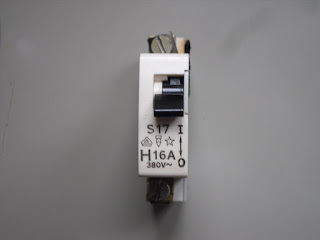
Here is Wikipedia's definition: "A circuit breaker is an automatically operated electrical switch designed to protect an electrical circuit from damage caused by excess current from an overload or short circuit. Its basic function is to interrupt current flow after a fault is detected. Unlike a fuse, which operates once and then must be replaced, a circuit breaker can be reset (either manually or automatically) to resume normal operation."
I'll tell you something else it is at the moment: a metaphor. For the government of Wales and perhaps soon that of N.Ireland, Scotland and the whole of the UK is not literally going to install electrical switches anywhere. They are going to attempt to halt the spread of Corona Virus by avoiding an overload of cases in their area. So "circuit-break(er)" or "fire-break" in the case of Wales is a technical term being used metaphorically.
What is the difference between a metaphor and a simile? A metaphor takes a word or phrase from one semantic field and applies it to another. For example, "the handling of the pandemic has been a total car crash." No actual cars have been involved; it's a metaphor.
A simile (from the Latin "similis" = "like") says that something is like something else. "A total lockdown (metaphor) acts like a circuit-breaker (simile)." It makes the comparison clear which the metaphor just implies.
Both metaphor and simile are "figures of speech." (There are loads more, which might crop up in future weeks).
October 12, 2020
Nobody likes a pedant
"1a : one who is unimaginative or who unduly emphasizes minutiae in the presentation or use of knowledge. b : one who makes a show of knowledge. c : a formalist or precisionist in teaching."
This is the Merriam Webster dictionary definition of "pedant." You see you have to get to the third possibility before you find anything positive said. No-one enjoys being corrected so pedants tend to be unpopular. But if you are a pedant, like me (unapologetically so), you actually spend a lot of time not correcting people and biting your tongue.
Just this morning on Facebook I have seen the following:
1. Two children's story's
2. "Who's school" and "stationary" for "stationery"
3. My friend showed x and I a new way ...
4. Under bed draws
The only one I commented on was the second - because it was part of a meme pointing out that teachers were not getting pay rises, though MPs were. It seemed to be a bad place to make grammatical or vocabulary mistakes. Even so, someone replied that the message was more important than proofreading. No doubt but it would have been a better post without them.
The first was in an inquiry to a children's book group I belong to; the writer is a newbie and someone I don't know so it would have been unkind to correct her.
The third is common even among people "educated" at Eton. It is just plain wrong. And so easy not to do! Just take out the other person. You would never say "my friend showed I," unless you were speaking dialect. It was in a post by a published author too.
The fourth is seen every day in FB advertisements for items for sale such as "chests of draws."[sic] But this one made me think of Tracy Emin's unmade bed installation.
In an article in the Guardian headed "Why do pedants pedant" David Steele concludes: "So, why do pedants pedant? We don’t really know, but some tangential studies infer it’s to do with a mixture of personality, status-signalling and group identification."
I couldn't find a picture of a pedant, but you can take the one at the top of this post as a real life example. And here is a picture of a "chest of draws," actually so labelled on Wikimedia Commons. Sigh.

October 5, 2020
New words
Grammar Grandma takes requests! Today, new words and phrases, technically known as "neologisms."
These arouse strong feelings and the request for this post included the statement, "we like 'Normality' which is a Nice Word, and ... we hate 'Normalcy' which is a Very Horrid Word Indeed." Nice words and Horrid Words tend to be defined in the eye of the beholder but let's look at these two.
"Normality"is much older than "normalcy," and, as so often with words that annoy UK speakers of English, the latter is an American import.
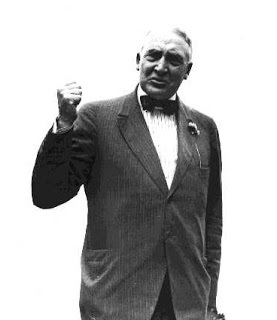 Warren G. Harding, who did not invent "normalcy."
Warren G. Harding, who did not invent "normalcy." Merriam Webster says,
"Warren G. Harding adopted this word in the presidential election of 1920, stating that he was for “normal times and a return to normalcy.” “A return to normalcy” soon became the slogan most identified with his campaign, to the considerable chagrin of many who felt that normalcy was either a corruption of normality, or simply a non-existent word. A columnist in the New Orleans States spoke for many when he wrote “The friends of Senator Harding are defending his language now by saying that “normalcy” is a perfectly good word. Well, so is jackasstical, when applied to fantastic verbiage.”
Normalcy did exist already, although it was not, at that time, a particularly common word. It had a specific function in mathematics, and our earliest known record of the word comes from a mathematical dictionary published in 1855:
If we denote the co-ordinates of the point of contact, and normalcy, by x” and y”, the equation of the tangent is, y-y” = dy”/dx” (x-x”).
—William Guy Peck, Mathematical Dictionary and Cyclopedia of Mathematical Science: Comprising Definitions of All the Terms Employed in Mathematics-An Analysis of Each Branch, and of the Whole, as Forming a Single Science, 1855
Some of the people who savaged Harding for his use of normalcy did allow that the word existed, but felt that since it was a term peculiar to the iniquitous realm of math it should not properly be employed to indicate normal things. However, Harding was also not the first person to have manhandled normalcy out of its jargonistic cocoon; plenty of other, less-famous, people had been using it in such a manner since the 19th century.
A little wine at once warms them into candor and normalcy, and then grand airs fly off like a covey of partridges, not to return, at least the same evening.
—The Chicago Times, 14 Feb. 1875The party appetite may have become etherealized, changed to babe-like normalcy.
—Vermont Watchman & State Journal, 8 Mar. 1893They want money of over-full value. It is the return to normalcy in monetary value that they wish to prevent.
—The Times-Democrat (New Orleans, LA), 7 Sept. 1896
Many newspapers, in reporting on Harding’s use of normalcy, stated that it was in several contemporary dictionaries. Harding himself made this point, when he was asked on the campaign trail to define the word: “I have looked for ‘normality’ in my dictionary, and I did not find it there. ‘Normalcy,’ however, I did find, and it is a good word.” However, given that this was taking place at a time when information spread less rapidly than it does today, it is understandable that many people thought that it must have been invented recently."
I hope that helps. If you think "normalcy" is a Horrid Word, like my correspondent, you can still use "normality."
Personally, I find "herstory" to be a Horrid Word, even though it was coined by my generation of feminists to reclaim history from the chaps.
Polonius thought "beautified" to be a "vile phrase" in Hamlet's letter to his daughter Ophelia; these things are very subjective.
Some neologisms I admire and use: "mansplaining," though just as linguistically hybrid as "herstory," does the job without need for further explanation. Apparently, there is also "hepeating," to mean making a point by a man that a woman has already made and had ignored. I can imagine using that.
Here are some more for you and you can judge if they are Nice or Horrid:
Al desko - eating at your work desk (cf Al fresco)
Chugger - a charity "mugger."
Covidiot - one who does, thinks or says stupid things during the current pandemic
Fatberg - a disgusting drain or sewer blockage of fat and other detritus
Frenemy - a mixture of friend and enemy
Glamping - glamorous camping

Photobomb - getting yourself into someone else's photo without their knowing.
Twerking - dancing provocatively, using a lot of bottom
Tell me which are the ones you like and which you hate, even if not listed here. Personally, I use the word "cromulent" which comes from American TV show The Simpsons and means something like viable, acceptable. It has even made it into the OED.
Mary Hoffman's Blog
- Mary Hoffman's profile
- 591 followers



